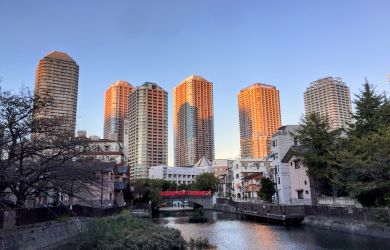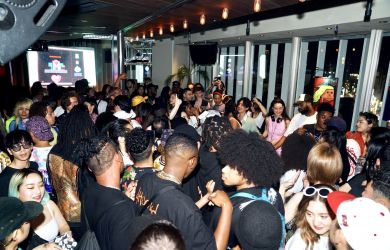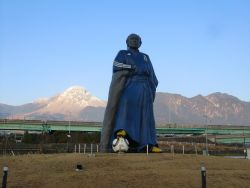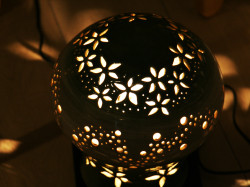
Originally published on metropolis.co.jp on January 2013

Tidbits
Asakusa is famous for its wagashi. Kanmidokoro are cafés to sit and enjoy these traditional sweets, paired perfectly with green tea.
Iriyama Sembei 1-13-4 Asakusa Their hand-toasted rice crackers are finest when hot off the grill.
Umezono 1-31-12 Asakusa Try the awa zenmai, a thick millet porridge topped with a sweet azuki paste.
Funawa 1-22-10 Asakusa The bite-sized sweet-potato balls come in flavors like mattcha, azuki, or strawberry.
Kimuraya Ningyoyaki 2-3-1 Asakusa Azuki-stuffed small cakes, best when fresh and hot.
A visit to Asakusa is a little like stepping back in time. The historic shitamachi district is filled with great restaurants, many of them very traditional and with a focus on just one cuisine. The menus and décor of these shops reflect the quaint, nostalgic atmosphere of the neighborhood. If you’re looking for that old-time Tokyo vibe, then the following backstreet eateries are well worth seeking out.
Otafuku
Oden, the hot-pot stew of fish cakes and vegetables, really hits the spot in this cold weather. Kanto-style oden is made with a rich, dark-colored soy broth and is the typical type served in Tokyo. Otafuku, however, serves it Kansai-style, with a delicate broth that allows diners to better taste the different ingredients. Or so they say.
Otafuku started serving oden in 1915, though they took a break during the Second World War. The fifth-generation owner still manages a large hot pot behind the long, wooden counter. He dishes up orders onto small serving plates and garnishes each one with karashi (spicy Japanese mustard), on the side. Some of our favorite items are rolled cabbage stuffed with ground meat, tender octopus legs, Satsuma-age fishcakes, yuba (tofu skin) and hanpen—a fluffy, light fishcake that resembles a marshmallow in texture. Nerimono is the group of foods made from ground fish, molded into different shapes, and then cooked—either fried, steamed, or broiled—before being added to the pot. The oden is ordered in sets, often three pieces per order. We like to order one nerimono, a vegetable, and then something like konnyaku, kombu, or a hard-boiled egg.
Otafuku has a full menu that also includes sashimi, grilled meats, and gyu suji nikomi (simmered beef tendon). The drink list features the staples: beer and a selection of nihonshu and shochu.
1-6-2 Senzoku, Taito-ku. Tel: 03-3871-2521. www.otafuku.ne.jp
Yutaka
Perhaps most striking about this restaurant is the lack of that frying smell typical in tonkatsu places. Perhaps it’s to do with Yutaka’s time-honed culinary skills, which it has been sharpening ever since it opened just after the war.
Great attention is paid to each ingredient, from the Yamato pork from Gunma to the panko (bread crumbs), from bread that takes four days to make. Even the earthy nukazuke pickles have a rich taste, reflecting the care taken to manage the fermenting pot of rice bran.
The tonkatsu at Yutaka is non-greasy with a crisp crust and meaty interior. As oysters are in season this time of year, kaki furai (breaded fried oysters) is a special treat. Other katsu include crab croquette, shrimp, and scallops. The menu also includes a sautéed pork dish, as well as the ginger and soy sautéed pork dish shogayaki. Small sides include yakitori, monkfish liver, and shiokara—funky fresh squid innards.
Popular with locals but off the main drag, this shop—which offers excellent service from the welcoming staff—tends to stay largely clear of tourists.
1-15-9 Asakusa, Taito-ku. Tel: 03-3841-7433. www.tonkatu-yutaka.com/index.html
Yoshikami
Also further away from Nakamise Dori and Sensoji is Yoshikami, a classic restaurant specializing in yoshoku—the Japanese interpretation of Western-style cuisine. The dining room feels like a typical American diner with red- and white-checkered tablecloths and a counter overlooking the open kitchen and the cooks at work. A disturbing number of tomato-sauce bottles line the kitchen wall, as it is a key ingredient in the classic omuraisu dish: ketchup-seasoned rice enveloped in a fluffy omelet.
The menu is unusually large and includes many grilled meats, sandwiches and pasta. Our favorites are the rich beef stew, the cow tongue stew, the hamburg steak, and of course, the omuraisu. At yoshoku restaurants the Japanese staple is not called gohan but raisu, as it’s served on a flat Western-style dish and not in a bowl.
When oysters are in season October to March, Yoshikami serves them up grilled, au gratin, à la meunière—and in spicy “Diablo” form.
1-41-4 Asakusa, Taito-ku. Tel: 03-3841-1802. www.yoshikami.co.jp
Asakusa Imahan

This 6th-generation shop has been serving wagyu nabe (beef hot pot) both sukiyaki- and shabu-shabu-style since 1895—and since 1928 in its current location. Marbled Japanese beef is sliced thin for these dishes, which diners cook on small gas burners at each table. During lulls in restaurant conversation, listen for the “gutsu gutsu” sound of the sukiyaki pot bubbling.
Asakusa Imahan created beef Tsukudani, sold at most Tokyo depato. Named after Tsukudajima (the fishing village/island in the middle of the Sumida River), the dish is traditionally made with seafood or sea vegetables seasoned with a sweet soy sauce. The beef version is a modern twist, and is a popular omiyage for diners to take home.
Some of the lunch dishes come pre-cooked—so ask for something you can cook yourself if you want to fully enjoy the experience. Reservations are recommended.
3-1-12 Nishi-Asakusa , Taito-ku. Tel: 03-3841-1114. www.asakusaimahan.co.jp/english
Oiwake
The food at Oiwake is typical izakaya fare including fish and seafood in various guises, and a simple selection of beer and sake. But people tend to come here for other reasons.
The izakaya is a storied venue for live folk music, where artists like the Tsugaru-shamisen playing Yoshida brothers cut their teeth before hitting it big. The beating of taiko drums provides an energetic atmosphere, with singing and dancing by the talented staff three times a night.
Diners are occasionally invited to sing on stage, a unique live karaoke the shop is famous for. The music is performed at set times in the evening and there is a minimal cover charge.
Between performances the house musicians mingle, and regular customers are always welcoming to newcomers. All in all, it’s a memorable evening—one that could only be had in Asakusa.
3-1-2 Nishi-Asakusa, Taito-ku. Tel: 03-3844-6283. www.oiwake.info/eng.html




-390x250.jpg)
